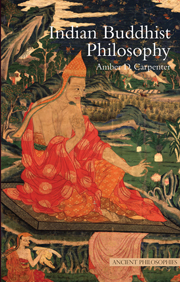Book contents
- Frontmatter
- Contents
- Preface
- Acknowledgements
- Abbreviations
- Chronology
- Development of Buddhist thought in India
- 1 The Buddha's suffering
- 2 Practice and theory of no-self
- 3 Kleśas and compassion
- 4 The second Buddha's greater vehicle
- 5 Karmic questions
- 6 Irresponsible selves, responsible non-selves
- 7 The third turning: Yogācāra
- 8 The long sixth to seventh century: epistemology as ethics
- Epilogue
- Background information
- Notes
- Bibliography
- Index
7 - The third turning: Yogācāra
- Frontmatter
- Contents
- Preface
- Acknowledgements
- Abbreviations
- Chronology
- Development of Buddhist thought in India
- 1 The Buddha's suffering
- 2 Practice and theory of no-self
- 3 Kleśas and compassion
- 4 The second Buddha's greater vehicle
- 5 Karmic questions
- 6 Irresponsible selves, responsible non-selves
- 7 The third turning: Yogācāra
- 8 The long sixth to seventh century: epistemology as ethics
- Epilogue
- Background information
- Notes
- Bibliography
- Index
Summary
Who can believe that Vasubandhu, to say nothing of his acquaintance with the Sāṁkhyā, was a Vaibhāṣika in his youth, a Sautrāntika in his mature years, a Vijñānavādin in his old age, and a Pure Land follower of Amitābha at his death?
(Lamotte, History of Indian Buddhism, 39)Vasubandhu is a slippery customer. Trained in the Vaibhāṣika tradition of Abhidharma – either a variant or dissenting offshoot of the Sarvāstivādins – he nevertheless criticizes his own exposition of Vaibhāṣika orthodoxy as being too opulent, offering too much elaboration on the simplicity of the Buddhist view as articulated in the sutta-pitaka. Buddhists thus inclined came to be called Sautrāntikas: sütra-followers. Of course, all Buddhists follow the sütras; the Sautrāntikas, we might say, made a particular point of it, rejecting or challenging elaborations of the discourses of the Buddha, as these might be found in the Abhidharma canon, for instance. “What is the meaning of sautrāntika?”, asks the early commentator, Yaśomitra. “Those who take sütra as their authority, not śāstra, are Sautrāntikas.” The śāstras, in this context, are the recognized Abhidharma texts, which Vasubandhu reminds us are not the word of the Buddha, and so their truth is open to dispute.
This boast was not necessarily recognized by other Abhidharma schools, who may have referred to this group of Abhidharmikas as Dārṣṭantikas (‘those who employ examples’), but distinctions (if any) and relations between various positions, schools of thought, and thinkers during this period and earlier is uncertain and much contested in the scholarly literature.
- Type
- Chapter
- Information
- Indian Buddhist Philosophy , pp. 137 - 168Publisher: Acumen PublishingPrint publication year: 2013

